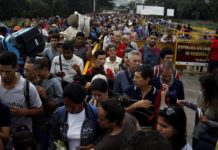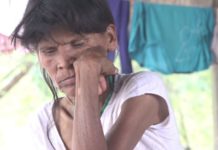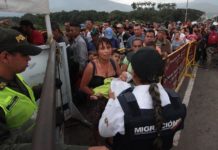Venezuela heading for dictatorship after ‘sham’ election, warns US amid clashes
Sibylla Brodzinsky and agencies
Up ti 14 feared dead in clashes with security forces as many voters boycott poll that President Nicolás Maduro hails as a ‘vote for peace’
The United States has vowed to take strong and swift action against the “architects of authoritarianism” in Venezuela after protesters and security forces fought deadly street battles during voting for President Nicolás Maduro’s controversial constitutional assembly.
“The United States stands by the people of Venezuela, and their constitutional representatives, in their quest to restore their country to a full and prosperous democracy,” the US State Department said in a statement. “We will continue to take strong and swift actions against the architects of authoritarianism in Venezuela, including those who participate in the national constituent assembly as a result of today’s flawed election,” it said.
Many voters decided against taking part in an election the opposition said would turn the country into a full-fledged dictatorship.
As many as 14 people died in the protests, according to opposition leader Henrique Capriles, and the prosecutor’s office confirmed at least six people were killed by gunfire, including one national guardsman. Seven policemen were wounded in an explosion in the opposition stronghold neighbourhood of Altamira.
However, the leader of the ruling socialist party, Jorge Rodriguez, said there was “not one death related to the voting process today”, underscoring the contrasting versions of the day presented by the two clashing sides.
Nikki Haley, the US ambassador to the United Nations, tweeted: “Maduro’s sham election is another step toward dictatorship.”
An official report of a “positive” election process by the National Electoral Council contrasted with continued reports of clashes and widespread abstention as people either heeded opposition calls for a boycott or feared getting caught up in street clashes.
The council extended voting for one hour, claiming many who had wanted to cast
their vote earlier had been unable to do so.
Maduro was among the first to vote shortly after polls opened at 6am. “The first vote for peace,” he said afterwards. But throughout the day, turnout at polling stations was low for the election of 545 members of an assembly that would be tasked with rewriting the constitution and would have sweeping powers to reform or dissolve other state institutions, including the opposition controlled parliament.
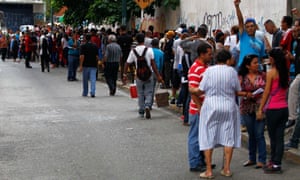
In the working-class district of Petare, where many residents said they had been threatened with losing government subsidies or jobs if they did not vote, few people turned out to vote. But at the Poliedro sporting arena, where Caracas residents who were unable to reach their designated polling centre were permitted to cast their votes, voters described huge crowds standing in line. For Maria Alejandra Avila, a lawyer , the election was a manifestation of “the self–determination of a free and sovereign people”.
The constituent assembly has been heavily criticised by foreign government including from the United States, the UK and neighbouring Colombia. On Sunday, Peru and Argentina said they would not recognise the outcome of the vote.
Security forces blocked protesters from gathering for a planned mass demonstration using teargas to disperse the crowd, witnesses said. A small group of protesters blocked access to some of the voting places.
“The oppressive forces didn’t allow us to even get to the meeting point,” said protester Emilia López, 23. “It is frustrating that they try to keep us quiet with bombs.”
Opposition leader María Corina Machado told reporters that this moment was the beginning of a new phase for Venezuela.
The defence minister, Vladimir Padrino López, told reporters that a 130,000-strong security force was “actively containing” flareups across the country, adding that as many as 100 voting machines had been destroyed.
Security cordons were set up around each voting centre and reporters were not allowed beyond that point to witness people casting their votes. After more than four months of protests sparked by the pro-government supreme court decision to strip the opposition-controlled parliament of its legislative powers, the government banned protests ahead of Sunday’s vote.
Maduro has said the assembly will help bring peace to the politically split country, but the opposition, and increasingly the international community, have warned that it will only serve for Maduro and the ruling socialist party to tighten their grip on power. The new assembly will be convened within 72 hours of the election and will function with virtually unlimited powers. Maduro and his closest allies have vowed to use the assembly to jail key opposition leaders, remove the country’s outspoken chief prosecutor from her post and strip opposition legislators of their constitutional immunity.
Polls show that Maduro, successor to Hugo Chávez, who set the country on a socialist path, has only about a 20-point approval rating and that 70% of Venezuelans do not want the constitution of 1999 rewritten.
Maduro said on Saturday that the assembly would act as a “superpower (…) above and beyond every other”. The assembly, he said in a television address ahead of the vote, will be empowered to strip opposition legislators of immunity from prosecution. “The right wing already has its prison cell waiting,” the president said.
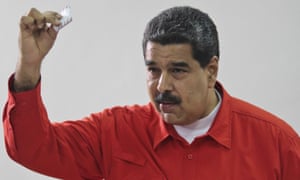
Maduro accused right-wing governments of trying to sabotage “21st century socialism”.
The US imposed targeted sanctions against 13 current and former officials close to the government last week and has primed further measures if the assembly vote was held, which may affect Venezuela’s oil industry, one of the few economic lifelines left in the country.
Under Maduro, elected after Chávez’s death from cancer in 2013, the once buoyant oil-based economy plunged into crisis crippling the social programs Chavez had set up for Venezuela’s poor majority. Price controls brought widespread food and medicine shortages and spiralling inflation, as well as unbridled violence, driving millions of Venezuelans to leave the country.
Additional reporting by Ana Sofia Romero in Caracas




